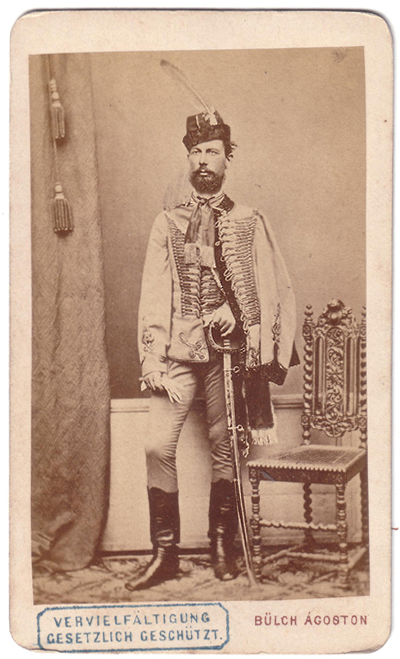Bülch
Ágoston et Török Flóris produisirent en 1867, ŕ
l'occasion du couronnement de l'Empereur d'Autriche
Franz-Josef comme Roi de Hongrie, une série de portraits
des dignitaires du Royaume (des albums lui seront offerts
ŕ l'initiative du Comte Andrássy).
On retrouve sur le
site de de l'Österreichische Nationalbibliothek un
magnifique exemplaire colorisé de ce portrait :
|
A titre
d'illustration, je ne résiste pas au plaisir de vous
proposer ce savoureux compte-rendu publié dans le Times
le 11 Juin 1867 :
"THE
CORONATION OF THE KING OF HUNGARY
(FROM OUR SPECIAL CORRESPONDANT)
PESTH, June 6.
Within a four days' journey of our shores there is now in
progress a scene such as might have been witnessed in the
old barbaric world, when Kings were crowned with strange
magnificence ; (...)
There was a small gathering at the foot of an hotel
staircase this morning of positively startling people.
One had a tall calpak of gray astrakan fur, with a yellow
satin bag, ending in a great tassel of gold lace. On the
front of the calpak was a scarlet medallion, bearing in
embroidery the badges of the House he served -apples and
leaves- his brown face and black moustache contrasted
with a white lace frill with long ends ; the gold laced
collar of his scarlet hussar jacket was crusted with gold
; from his shoulders hung a pelisse of green and silver
trimmed with gray fox-skin, and worked all over with
apples and leaves in silver ; his tight pantaloons of
flaming red were slashed with silver, and his boots were
of yellow Morocco leather, with a band of gold lace and
tassels at the top, and gilt heels and enormus spurs, the
get up being completed by a heavy curved scimitar, ablaze
with all kinds of metallic finery. He and his fellow
regarded each other in their new clothes with much
curious wonder, each miratur novas frondes et non sua
poma. These were but the "life hussars," or
personal attendants of a Magyar noble, and wereby no
means singular for a finery among those with whom they
stood. There were men who shone as if they were in
armour, in their particoloured clothing, and it was not
possible their masters could devise greater glory of
attire for themselves - at least one might be pardoned
for thinking so. (...) miratur novas frondes et non sua
poma. These were but the "life hussars," or
personal attendants of a Magyar noble, and wereby no
means singular for a finery among those with whom they
stood. There were men who shone as if they were in
armour, in their particoloured clothing, and it was not
possible their masters could devise greater glory of
attire for themselves - at least one might be pardoned
for thinking so. (...)
|

